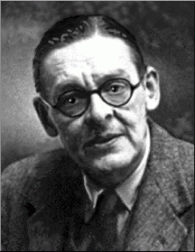The Incarnation — Was it birth or was it death?

The passion of Christ is generally though to encompass the final hours of Jesus’s life. But is that so? T. S. Eliot’s imaginative poem, “The Journey of the Magi,” suggests that the passion began much earlier.
Eliot would have us see that the coming of the baby Jesus is much more than the sentimental story we often hear at Christmas. He would have us set the manger story in its proper context—the doctrine of the humiliation and condescension of Christ. Christ “emptied himself,” took on the “form of a servant,” was “born in the likeness of men,” and became obedient to the “point of death” (Phil. 2:5-8).
“The Journey of the Magi” is also about conversion and the natural consequence of conversion—a dis-ease with the present dispensation.
The Journey of the Magi
‘A cold coming we had of it,
Just the worst time of the year
For the journey, and such a long journey:
The ways deep and the weather sharp,
The very dead of winter.’
And the camels galled, sore-footed, refractory,
Lying down in the melting snow.
There were times we regretted
The summer palaces on slopes, the terraces,
And the silken girls bringing sherbet.
Then the camel men cursing and grumbling
And running away, and wanting their liquor and women,
And the night-fires going out, and the lack of shelters,
And the cities hostile and the towns unfriendly
And the villages dirty and charging high prices:
A hard time we had of it.
At the end we preferred to travel all night,
Sleeping in snatches,
With the voices singing in our ears, saying
That this was all folly.
Then at dawn we came down to a temperate valley,
Wet, below the snow line, smelling of vegetation;
With a running stream and a water-mill beating the darkness,
And three trees on the low sky,
And an old white horse galloped away in the meadow.
Then we came to a tavern with vine-leaves over the lintel,
Six hands at an open door dicing for pieces of silver,
And feet kicking the empty wine-skins,
But there was no information, and so we continued
And arrived at evening, not a moment too soon
Finding the place; it was (you may say) satisfactory
All this was a long time ago, I remember,
And I would do it again, but set down
This set down
This: were we led all that way for
Birth or Death? There was a Birth, certainly,
We had evidence and no doubt. I had seen birth and death,
But had thought they were different; this Birth was
Hard and bitter agony for us, like Death, our death,
We returned to our places, these Kingdoms,
But no longer at ease here, in the old dispensation,
With an alien people clutching their gods.
I should be glad of another death.
Sources & Resources:
“The Journey of the Magi” is available online at The Poetry Archive. Their posting of the poem includes a remarkable recording of T. S. Eliot reading the poem for a BBC broadcast.
For a theological presentation of these important doctrines, the Puritan pastor John Owen preached a sermon on November 9, 1681 entitled “The humiliation and condescension of Christ.” It is available here on the website of Christian Classics Ethereal Library.


 December 23, 2013
December 23, 2013 







Comments are closed.